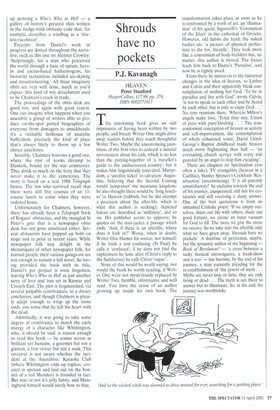Leaving his heart with the dead
Benji Wilson
WHO'S WHO IN HELL by Robert Chalmers Atlantic Books, £12, pp. 272, ISBN 1903809991 Newspaper obituary notices used to be paper gravestones until Hugh Massingberd, former obituaries editor of the Daily Telegraph, sat up and saw the funny side. A life worth committing to record, he decided, should contain a bit of funnypeculiar as well as a bit of funny-ha-ha: under his stewardship, obituaries began to appear containing both.
In true Massingberd style this may seem wholly irrelevant to the novel at hand, except that, as the title obliquely suggests, Robert Chalmers has chosen to pin his tale on a pair of obituarists. The less interesting of the two is the novel's protagonist. The more interesting one is called Alexander Whittington; he is more interesting because he is a cipher for Hugh Massingberd.
Both Massingberd and necrology are extraordinarily good subject-matter, Massingberd because he is an English eccentric of the sort Hollywood imagines shoot snipe in their underpants, and necrology because it comes with an air of the macabre. People who don't work for papers are still amazed that obituaries are written long before the person's death — amazed and slightly disturbed, as preempting a tragedy feels like pre-booking a funeral. The idea of making a living from the dying — scouring the papers for hints of early-onset anything, scrutinising chatshows for the first splutters of pneumonia — seems both intriguing and mildly repulsive.
Evidently, all of this is perfect novel material and, as a former Telegraph obituary writer, Robert Chalmers's debut features some choice pickings from his experiences with the soon-to-be-dead. Not only is he gifted his best character — Whittington/Massingberd — but he also feeds off Massingberd's obituary style for his own fluent prose style and many of his best gobbets.
The story revolves around Daniel Linnell, who falls into writing obits and ends
up penning a Who's Who in Hell — a gallery of history's greatest shits written in the nudge-wink obituary code that, for example, describes a windbag as a 'tireless raconteur'.
Excerpts from Daniel's work in progress are dotted throughout the narrative, such as this one on Aleister Crowley: 'Surprisingly, for a man who perceived the world through a haze of opium, heroin and cactus-based hallucinogens, his favourite recreations included ice-skating and mountaineering.' All these imaginary obits are very well done, much as you'd expect: this kind of wry detachment used to be Chalmers's stock in trade.
The proceedings of the obits desk are good too, and again with good reason One can imagine what happens when you assemble a group of writers able to produce on-the-spot potted biographies of everyone from dowagers to smackheads: it's a veritable hothouse of anarchic bufferdom, precisely the kind of place that's always likely to throw up a few choice anecdotes.
Sensibly, Chalmers borrows a good one, where the cast of kooks decamp to Dunkirk, bound for the war cemeteries. They drink so much on the ferry that they never make it to the cemeteries. The story is based on a real 1988 Telegraph beano. The few who survived recall that there were still five courses of an 11course lunch to come when they were ordered home.
Unfortunately for Chalmers, however, there has already been a Telegraph book of Rogues' obituaries, and the mangled St Peter's gate that is a newspaper obits desk has not gone unnoticed either. Several obituarists have popped up both on stage and in print in recent years. While newspaper folk may delight in the shenanigans of other newspaper folk, for normal people their various goings-on are not enough to sustain a full novel. So having provided the book with its title, Daniel's pet project is soon forgotten, leaving Who's Who in Hell as just another story of love and loss set in Kansas and Crouch End. The plot is frogmarched, via several palpable contrivances, to a dreary conclusion, and though Chalmers is plainly adept enough to wrap up the loose ends, you sense that he left his heart with the dead.
Admittedly, it was going to take some degree of contrivance to match the early energy of a character like Whittington, who, it should be said, is reason enough to read this book — he comes across as brilliant yet humane, a gourmet but not a glutton, a bon viveur but not a soak. This reviewer is not aware whether the incident at the Anarchists' Karaoke Club (where Whittington ends up topless, covered in sputum and laid out on the bonnet of a red Mondeo) is founded in fact. But true or not it's jolly funny, and Massingberd himself would surely bow to that.



















































































 Previous page
Previous page